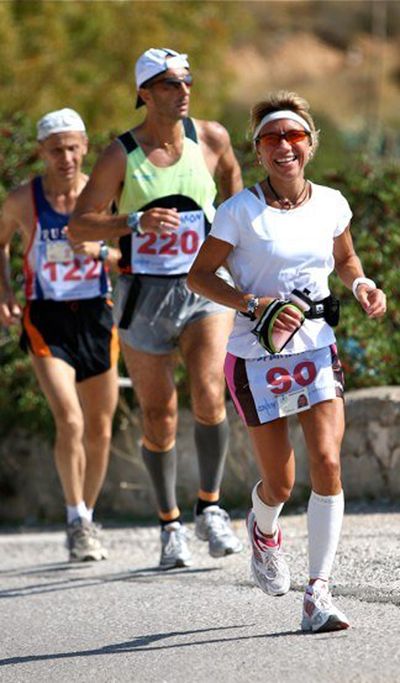Spokane doctor finishes 153-mile Spartathlon
Not even rain can spoil Bliss’ day in ‘ultra’ sun

Look closely, and you’ll see Lisa Bliss smiling, even in the rain.
That’s not unusual. The Spokane doctor loves to run.
And what’s not to like? She’s hoofing it in Greece.
Even finishing in a torrential downpour couldn’t wash away the smile, but that’s where the story takes life because Bliss adds it rained for the last 30 miles of run, which is known as Spartathlon.
Spartathlon follows the route of Pheidippides, who ran the 246 kilometers – 153 miles around here – from Athens to Sparta in 490 B.C.
The race is considered one of the hardest, if not the hardest, ultra road race. Bliss finished in 32 hours, 23 minutes, 26 seconds, 44th out of the 133 finishers (320 started), the highest finishing American and third woman overall.
“It was so much fun,” she said on Thursday, her first day back to work after running the previous weekend. “I had such a great time. What a great experience. I’m fully satisfied. I still have a smile on my face.”
Truth be told, she said, the smiles in pictures taken by crew member Glen Tachiyama are a reflex from having a camera pointed at her and not because the endeavor is easy.
The race Web site describes the course this way:
The Spartathlon runs over rough tracks and muddy paths (often it rains during the race), crosses vineyards and olive groves, climbs steep hillsides and, most challenging of all, takes the runners on the 1,200-meter ascent and descent of Mount Parthenio in the dead of night. This is the mountain, covered with rocks and bushes, on which it is said Pheidippides met the god Pan. In 2,500 years man has had no impact at all. There is still no pathway over the mountain that is swept by strong winds with temperatures as low as 4 degrees C.
It was at the end of the descent, or the 121-mile mark, that Bliss abandoned the race last year because of the concern she had over an ankle she sprained five days before the run. She worried that she was doing permanent damage to her ankle.
“It was the downhill that hurt my ankle,” she said. “I made the decision to end the race, always wondering if I would have been able to finish. I always wonder if I made the right decision. That’s why I had to go back this year.”
Bliss knew she had to run the race after serving on the crew in 2007 for “America’s best ultra-runner” Scott Jurek of Seattle, who won it three straight years beginning in 2006.
The difficulty, distance, challenge (there are time constraints, including 36 hours to finish), history and international appeal – the prerace meeting is held in three different languages – intrigued her.
Interestingly, Bliss, who believes she is the first person from Spokane to tackle this particular challenge, reached the marathon distance (26.2 miles) in the same time both years but was two hours faster to the mountain peak this year. And while she was limping along just ahead of the cutoff time on the descent last year, this year she was picking up time.
“Last year I was running to finish well,” she said. “This year I was running to finish. This year I didn’t run splits, I ran what I felt like my preserved exertion should be. I think I got a new respect of the course, just how difficult this race is, (so) I went into it with lower expectations.”
As for the future, it’s hard to guess, other than the fact Bliss will be running toward it.
“I am 100 percent satisfied with my race,” she said. “I’m at peace with the redemption I got from last year. I don’t feel the need to go back there (but) I might go back some day. I loved it.
“I could crew for a friend, but I do not have a major challenge on the horizon.”